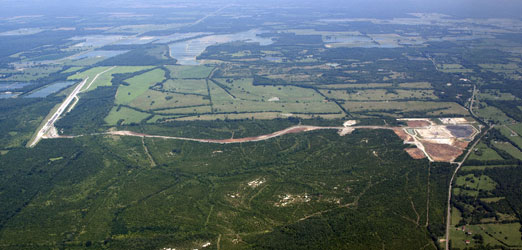TVA Coal Ash Controversy Continues
A panorama view of the Arrowhead Landfill in Perry County, Alabama, along with the surrounding area. Toxic TVA coal ash by the train load is filling up the landfill in Alabama’s Black Belt, causing air and water pollution in one of the poorest counties in the country…
by Glynn Wilson
The controversy over the toxic coal ash pouring into Alabama’s Black Belt from the TVA spill site in Kingston, Tennessee, continues today with the filing of another set of letters declaring an intent to sue the operators of the Arrowhead Landfill in Perry County on behalf of 155 local residents.
David Ludder, a Florida attorney who specializes in environmental law, filed the letters of intent to sue today, giving the landfill management 60 days notice.
The letters, signed by 155 residents of Perry County, accuse the landfill operators of violating the Solid Waste Disposal Act for air pollution that could impact the health of people who live nearby, and for operating what is basically an “open dump,” which is prohibited by law.
If found guilty, the company could be liable for up to $37,500 for each violation.
A copy of the letters were sent to the federal Environmental Protection Agency. One of the letters is included in the comments below.
In direct response to my questioning, the EPA’s public affairs office said the agency “understands the concerns of the people of Uniontown.”
“We want to be very clear that we’ve looked at this issue with the utmost care and met with local leaders and the surrounding community to review the disposal plan and answer questions. Our first priority is the health and safety of the people,” EPA spokesperson Davina Marraccini said. “The Arrowhead landfill was selected because it meets the most stringent federal solid waste disposal safety standards.”
The agency claims the landfill has a 100-foot buffer that surrounds the landfill property, and that the thickness and extremely low permeability of the Selma Chalk geologic formation beneath the landfill provide for additional natural protection of groundwater. The agency also claims the landfill staff conducts regular groundwater monitoring and air monitoring to ensure worker and public safety, although that contradicts what experts are finding on the ground.
The agency also claims it is working with the Alabama Department of Environmental Management to conduct ongoing monitoring of the landfill “to ensure it is operated properly,” Marraccini said. “EPA is watching this matter very closely to ensure that people are protected.”
According to Ludder, however, there is a problem with what EPA, ADEM and the landfill owners and operators are doing, and political and economic factors seem to matter more than the environment when it comes to the question of whether the coal ash should be regulated and disposed of as hazardous waste.
The coal ash contains numerous toxic, radioactive and carcinogenic compounds including arsenic, chromium, lead, mercury, thorium and uranium. Each of those compounds are regulated separately, but when combined in the waste from a coal-fired power plant, they are not now considered “hazardous” according to the federal regulatory scheme of things.
The EPA also has an office to deal with environmental justice issues, which is supposed to prevent pollution from being dumped more on poor people of color than the population at large under the Civil Rights Act.
“EPA is using the same excuse as ADEM always uses: If the activity complies with applicable rules, environmental justice is a non-issue. Not so,” Ludder said in response to EPA’s comments. “Title VI of the Civil Rights Act requires no disparate burden on minorities.”
A preponderance of the negative impacts of the landfill are falling on mostly poor, African-Americans who live in one of the poorest counties in the country, with an unemployment rate of around 19 percent.
According to Marraccini, EPA is reviewing both Ludder’s letters and petitions.
According to Ludder, the letters are legal documents giving the company and the government a notice of intent to sue, which is required by federal law to be served 60 days before a lawsuit is filed. Congress created the 60 day waiting period to allow the state or federal government to sue to enforce the law or for the violator to come into compliance.
Today’s legal action targets the companies operating the landfill. As we previously reported, the landfill owners declared bankruptcy the other day in what appears to be a stalling maneuver to prevent lawsuits.
Related Coverage
Perry County’s Arrowhead Landfill Going Bankrupt?
A Call for EPA Takeover of Alabama’s Water Program
Coal Ash Spill Anniversary as Forgotten as Disaster Itself
TVA Dumps Toxic Coal Ash in Poor Alabama Town
TVA to Begin Coal Ash Spill Cleanup March 20

No comments:
Post a Comment